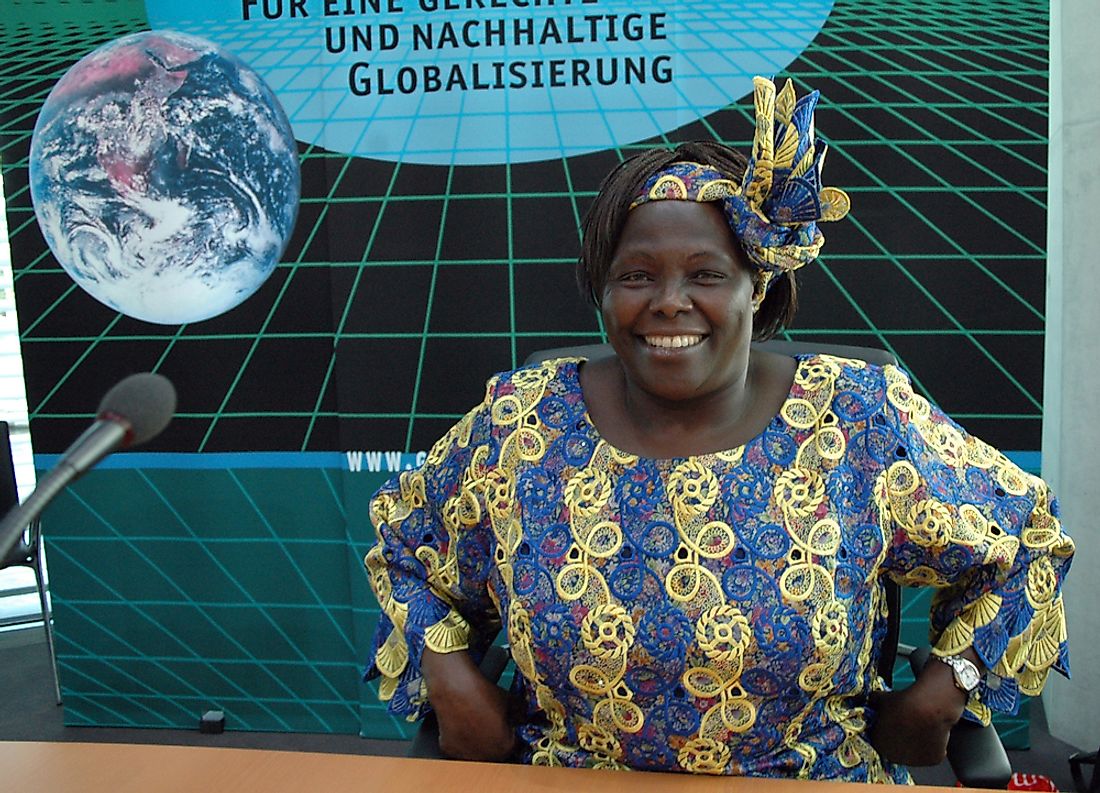Wangari Maathai – Important Figures in History

Wangari Maathai was a Kenyan political activist, an internationally known environmentalist, and a Nobel laureate. She was the first black African woman to win the Nobel Prize and the only environmentalist to win the Nobel Peace Prize. She was awarded the prize for her role in sustainable development and democracy. As a politician, Wangari Maathai served as a member of National Assembly and also as an assistant minister for environment and natural resources. She is a celebrated heroine in Kenya for her role in fighting for the conservation of natural resources, which often times landed her in problems with the authorities.
5. Early Life
Wangari was born on April 1, 1940, in the central highlands of Kenya. Her family relocated to the colonial-owned farm in Nakuru town, Rift Valley where her father had secured some manual jobs in in 1943. In 1947, Wangari returned to Nyeri with her mother to start schooling as there were no schools on the farm where her father worked. She joined Ihithe Primary School but was later transferred to St. Cecilia’s Intermediate School. She came top of her class and was granted admission at Loreto High School. Because of her exemplary performance, Wangari received a scholarship through Joseph P Kennedy Jr Foundation to study at Benedictine College in Kansas. She later joined the University of Pittsburgh for a master’s degree in Biology.
4. Career
In January 1966, Wangari Maathai was appointed a research assistant at the Kenyan University of Nairobi. However, upon returning to Kenya to begin her new job she was informed that the opportunity was no longer available and that someone else had been offered the job. Two months later, she secured a job as a research assistant in the microanatomy department in the Department of Veterinary Anatomy, a new department in the University College of Nairobi. In 1969, she was promoted to the position of an assistant lecturer and in 1975 she became a senior lecturer in anatomy and an associate professor in 1977.
3. Major Contributions
As a senior lecturer and one of the top university leaders, Wangari championed for the equal benefits for the female university staff, going as far as attempting to transform the academic staff association into a union. She founded the Envirocare Ltd, a business company which was involved in planting trees and promoting environmental conservation. In 1977, she founded the “Green Belt Movement” that encouraged women of Kenya to engage in planting tree nurseries throughout the country. The movement is one of the most successful environmental movements in East Africa. Through the movement, Wangari fought several attempts by the government to turn clear parks for development including the famous Uhuru Park and Karura Forest. She championed for democracy and free and fair elections in Kenya.
2. Challenges
Although Wangari Maathai was an accomplished environmentalist and politician, her achievements came at a huge cost. In 1977, she was divorced by her husband who claimed that she was "too strong-minded to be controlled.” Most of the activities of the Green Belt Movement were opposed by the government. Maathai was also considered a threat to the government since she opposed the government’s effort to privatize some of the public lands. President Moi even labeled her “crazy woman” for opposing the construction of a facility at the Uhuru Park. Her protest march through the city of Nairobi was often met with violent resistance from the police. She was detained without trial several times and sometimes false charges were preferred on her.
1. Death and Legacy
Maathai died on September 25, 2011, of ovarian cancer while receiving treatment in Nairobi. Her body was cremated a few days later. She left behind a rich legacy that continues to live on today. She was also the first president of the Africa Union’s Economic, Social and Cultural Council. A corner at the Uhuru Park has been named “Freedom Corner” in her honor. She was the first East African woman to receive a Ph.D. and received several international awards for her role in environmental conservation.











